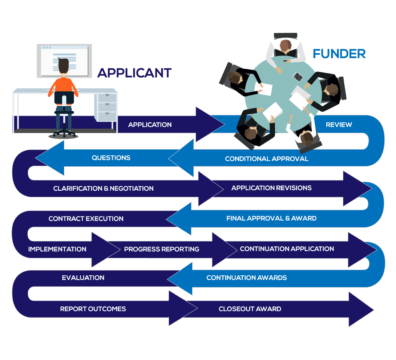 GRANT WRITING
Grant Writing Basics
Common Elements of a Grant Application
Proposal Development
Planning
Writing a Competitive Proposal
Goals and Objectives
Activities
Module Evaluation
GRANT BUDGETING
Budgeting Basics
Essential Budget Elements
Building Your Budget
Budget Management
Module Evaluation
GRANT MANAGEMENT
Management Basics
Post-Award Basics
Common Terms
Module Evaluation
R E S O U R C E S
GRANT WRITING
Grant Writing Basics
Common Elements of a Grant Application
Proposal Development
Planning
Writing a Competitive Proposal
Goals and Objectives
Activities
Module Evaluation
GRANT BUDGETING
Budgeting Basics
Essential Budget Elements
Building Your Budget
Budget Management
Module Evaluation
GRANT MANAGEMENT
Management Basics
Post-Award Basics
Common Terms
Module Evaluation
R E S O U R C E S
Home > Grant Management > Management Basics
Management Basics
So, you worked hard, wrote a great grant and got it funded. Everyone is thrilled! Then, reality sets in. All of those great ideas that you put on paper now have to become a reality.
Time to get to work!
Receiving grant funding means managing grant funding. Whether funded by the government, a foundation, or through another type of funding organization, effective grants management is essential. Don't worry, it isn't rocket science!
What is Grants Management?
Grants management encompasses the deployment of policies and procedures pertinent to the administration of a sponsored program. It is also referred to as the post-award administration phase in the grant award life cycle. All agencies have different post-award management policies, procedures and requirements depending upon the type of project and funding source. The following guidelines are designed to help you efficiently manage your award in compliance with your own organizational and sponsor policies and procedures.
Grants management is a complex and dynamic field that requires both common sense and specialized training.
A Grants Manager is responsible for administering, or managing, a grant award. This includes tracking project expenditures and progress, ensuring compliance with rules and regulations, reporting to the funder and ensuring that the project team has enough flexibility to successfully complete the work while still following all of the rules.
The grant lifecycle consists of pre-award and post-award activities. This module focuses on post-award activities.
Post-award activities encompass the essential functions of grants management, including:
Administration
Accounting
Compliance
Reporting
When you are managing a grant, you should be able to answer the following two questions.
1. Where is the funding coming from?
Sponsored projects (grant or contracts) of any kind can be funded through a wide variety of sources like private or philanthropic organizations, public charities, and federal or state agencies. It isn’t always easy to tell whether the funding for a project is from public or private sources, whether the agency that awarded you the funding is a pass-through entity, or whether your agency is considered a subrecipient or vendor. However, this information is crucial to your compliance and management efforts!
- Funding from local, national or international nongovernmental, nonprofit charities. Examples include: the Robert Wood Johnson Foundation, the Gates Foundation, the Colorado Health Foundation etc.
- Private foundations usually derive their principal funds from a single source, such as an individual, family, or corporation. They usually do not solicit funds from the public.
- Private foundations maintain or aid activities serving the public good, primarily through making grants to other organizations.
- Funding from local or national charities that solicit public donations. Examples include organizations such as the American Cancer Society or Susan G. Komen Foundation.
- Public charities derive their funding primarily from the public, receiving donations or funding from individuals, or grants from governmental and/or private foundations.
- Although some public charities engage in grantmaking activities, most conduct direct services or other tax-exempt activities.
- Funding from the Federal Government. Examples include the National Institutes of Health (NIH), Centers for Disease Control and Prevention (CDC), Environmental Protection Agency (EPA), etc.
- Funding is derived primarily though appropriation of federal tax revenue.
- Funding from the Federal Government. Examples include the National Institutes of Health (NIH), Centers for Disease Control and Prevention (CDC), Environmental Protection Agency (EPA), etc.
- Funding is derived primarily though appropriation of federal tax revenue.
2. What type of award are you managing?
Grants. Awards. Contracts. Cooperative Agreements. These are just a few of the kinds of “sponsored projects” you, as a Grants Manager, might oversee. It’s important to understand the differences between various award types.
A type of financial assistance awarded for the conduct of research or other program as specified in an approved proposal. A grant is used whenever the awarding office (or organization) anticipates no substantial programmatic involvement with the recipient during the performance of the activities. Grants are normally awarded by sponsors whose purpose in supporting research is scientific, cultural or philanthropic.
A mechanism for the procurement of a product or service with specific obligations for both sponsor and recipient. They may include restrictive terms, usually specified in the RFP, and require deliverables.
Similar to grants, but typically involve a significant level of sponsor participation.
A Subaward or Subcontract is a special category of sponsored project that may be made under a grant, contract or cooperative agreement and refers to work to be carried out at more than one institution.

